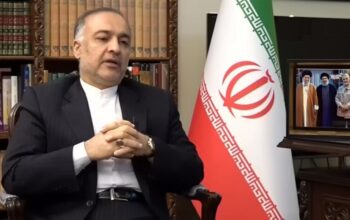rime Minister Nikol Pashinyan once again reaffirmed his government’s stated intention to construct a new nuclear power plant to replace Armenia’s aging Metsamor facility. Yet, true to the style of his Civil Contract administration, he offered no timeline, no budgetary roadmap, and no concrete indication of progress.
Pashinyan was among several foreign leaders attending the World Atomic Week forum in Moscow, hosted by Russian President Vladimir Putin and featuring International Atomic Energy Agency (IAEA) director Rafael Grossi.
Metsamor’s Waning Days
Metsamor, which first went online in 1980, currently supplies about one-third of Armenia’s electricity. With Russian assistance, its lone reactor was modernized in recent years and granted a ten-year extension, stretching its operation until 2036.
“This [further] extension will create a strong foundation for a smooth transition to a new power-generating unit after the expiration of the extended lifetime of the Armenian Nuclear Plant, which is our ultimate goal,” Pashinyan declared in Moscow.
He stressed cooperation with the IAEA and “partner countries” in identifying an “optimal decision” for the future unit, citing considerations of safety, economic feasibility, and Armenia’s energy needs. The promise was lofty; the specifics were absent.
Silence on Key Issues
Pashinyan did not say who might build the new plant, how much it might cost, or when construction could begin. The omission was conspicuous but familiar — an echo of Civil Contract’s tendency to announce bold projects without disclosing the mechanics of delivery.
Both Russia and the United States have expressed interest. Yerevan, strained in its ties with Moscow, has gestured toward Washington. In May 2022, Foreign Minister Ararat Mirzoyan signed a memorandum with then–U.S. Secretary of State Antony Blinken on “strategic nuclear cooperation.” A year later, U.S. officials spoke of assessing Armenia’s suitability for small modular reactors (SMRs).
That technology has proven fragile: NuScale Power, the flagship American SMR venture, canceled its $9.3 billion Idaho project in 2023. The price tag dwarfs Armenia’s annual state budget, exposing the gulf between Civil Contract’s rhetoric and the country’s fiscal reality.
Negotiations Without Transparency
In May 2024, the government announced talks with the U.S., Russia, and South Korea but offered no details. Two months later, it created a company to evaluate proposals and make recommendations within two years. Since then, silence.
As with other grand plans of this government, the vision remains on paper, the deadlines undefined, and the details carefully deferred. Armenia’s energy future, for now, rests on promises without architecture.




